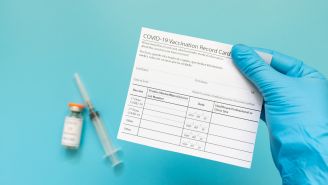Updated on March 29, 2022.
People age 50 and older can get a second COVID booster if it's been at least four months since their third shot. The U.S. Food and Drug Administration (FDA) authorized the additional dose on March 29. Hours later, the decision got the nod from the Centers for Disease Control and Prevention (CDC)–the final hurdle before people in this age group could start receiving their fouth shot of either the Pfizer of Moderna mNRA vaccine. Waning immunity among this more vulnerable age group prompted the decision.
The CDC noted that adults who adults who got the Johnson & Johnson COVID vaccine as their primary shot and booster can also get an additional mRNA booster if it's been at least four months since their second dose. Additional boosters are already available for people age 12 and older with weakened immune systems.
The move comes as the world was breathing a collective sigh of relief. Mask mandates and other preventative measures have eased, and more than 91 percent of the U.S. population lives in an area where community levels of COVID are low.
As of late March, more than 75 percent of eligible adults are full vaccinated, about half are boosted, and it’s estimated that roughly 86 percent of the U.S. population was either infected with COVID or vaccinated against the disease by the end of October 2021.
But Omicron’s sister—the subvariant known as BA.2—triggered a new surge in infections in Western Europe and Asia. The variant, which appears to be more contagious but not more severe than its predecessor, is now the dominant strain of COVID-19 in the United States, accounting for nearly 55 percent of new infections as of March 26.
Health officials reportedly remain cautiously optimistic that the U.S. may only see an uptick in new cases and not experience the surge that’s happening in other parts of the world. That is—if Americans continue to vaccinate and get a booster once they are eligible. It remains one surefire strategy to reduce pockets of vulnerable people, and patch the wall of immunity against COVID, which is stronger and taller in some places than others.
Among those at greatest risk: older people.
Declining protection among older adults
Since the pandemic began, older age emerged as a key risk factor for severe COVID. The immune system weakens with age. This helps explain why older people were among those first in line for the vaccines authorized for use in the United States. Now, as of March 27, 89 percent of those age 65 and older are fully vaccinated and about 67 percent are boosted.
But we also know that immunity—from vaccines and infection—wanes over time. And older people, in particular, may experience a more dramatic decline in their immunity.
A March 22 study published in the New England Journal of Medicine found the effectiveness of a third Pfizer dose at preventing symptomatic COVID fell from 67 to 46 percent just a few months later. A small February 28 study published in The Lancet Infectious Diseases also found immunity among older people dropped significantly three and a half months after a booster shot.
In the U.S., older people account for most new hospitalizations and deaths from COVID, and many are four months or more past their third shot.
The Biden administration and health officials have decided to offer adults age 50 and older an additional booster to help bolster their immunity and ward off a possible resurgence of the disease in the coming months.
“Current evidence suggests some waning of protection over time against serious outcomes from COVID-19 in older and immunocompromised individuals. Based on an analysis of emerging data, a second booster dose of either the Pfizer-BioNTech or Moderna COVID-19 vaccine could help increase protection levels for these higher-risk individuals,” said Peter Marks, MD, PhD, director of the FDA’s Center for Biologics Evaluation and Research in a March 29 news release.
“Additionally, the data show that an initial booster dose is critical in helping to protect all adults from the potentially severe outcomes of COVID-19. So, those who have not received their initial booster dose are strongly encouraged to do so,” Dr. Marks added.
Emerging data adds to mounting evidence that boosters help restore declining immunity. A March 13 study, which has not yet been published or peer reviewed, found protection against severe disease remains at 68 percent or greater for at least seven months after two doses of an mRNA vaccine. But efficacy against symptomatic infection drops to less than 20 percent after about six months or more.
The study also found, however, that efficacy against severe disease jumps to 80 percent and protection against symptomatic infection rises to about 70 percent a few weeks after a booster.






